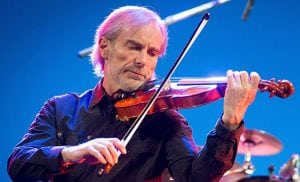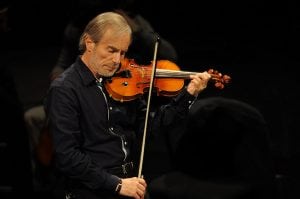In the world of violin, Jean-Luc Ponty is akin to The Beatles or Brian Wilson, a beloved figure and beacon of innovation for not only his instrument, but the genres of jazz, rock-fusion, and prog-rock. On tour with his original band from his most prolific period in the 70’s and 80’s, Ponty is playing Saban Theater Jun. 3 and The Coach House Jun.7.
It’s called the “Atlantic Years” tour—named for the albums he recorded for Atlantic Records— and for Ponty fans or fans of any of the genres he helped change forever, these are shows you don’t want to miss! Concert Guide Live chatted with Ponty—at home in Paris about fatherhood, moving to LA to play with Frank Zappa, and why this tour could be his last.
CONCERT GUIDE LIVE: You were born into a family of classical musicians. Was there any other choice for you as a career, or was it music all the way?
JEAN LUC PONTY: It was a natural attraction to music. It’s not because you have parents who are both musicians, and they could force you into it [laughs]. I loved it from the beginning, except for when I wanted to become a fireman because I loved the shiny helmet. As soon as I started learning musical instruments I loved it.
CGL: Was there a time you ever considered doing anything else?
JLP: No, in fact between 13 and 14, my mind was really set on becoming a musician. Music was my life. My parents were not too crazy about it, because they were struggling as music teachers, and they were worried for my future. It took me awhile to convince them to let me do it. My father said, ‘Ok, but you really have to do it right, and you really have to become good at it. You have to practice five hours a day from now on.’ At age 14 I started getting locked in the house and practicing five hours a day [laughs]. It was a bit tough, at that age, but I knew it was the price to pay and I was ready to invest my energy, because I wanted to do it. I wanted to dedicate my life to music.
CGL: One of your daughters is also a musician. Did you find that you experienced some of those same anxieties and fears that your parents had?
JLP: Exactly the same. And she behaved exactly like I did with my parents [laughs]. What’s important is to make sure someone has a strong will and a strong intuition about what they want to do and also that they have the talent to do it.
CGL: You’ve traveled all over the world playing your music. What do you look forward to about touring the U.S.?
JLP: I moved to America in 1973 when I was 31 years old. So many things were happening there at that time, musically, creatively, that was really the place to be. I didn’t know what would happen when I moved there. The first thing I did was tour with Frank Zappa and the Mothers of Invention, but beyond that I didn’t know. Once I was in the states, it was a chain of opportunities, one after the other. I decided to start my own band because I was writing music and it was important to me to start performing my own music. So I started my band in 1975 in Los Angeles. My real career, with my music, started in America, so I have a special relationship with the American audience because of that and Los Angeles in particular.
CGL: This tour is called the “Atlantic Years”. Why this tour? Why now?
JLP: After all these years, there was a renewed interest in the music of the 70’s and 80’s, my music and others. South America in particular, where I have a strong following, they really wished to see me come back with the same band. This was a few years ago. So we went to South America and then same thing in Europe.
CGL: Then the compilation was released [Electric Fusion: The Atlantic Years]?
JLP: They asked me to collaborate with the remastering and choice of pieces and all that. I’m not the kind of guy who listens to his own music all the time. I just move on to new experiences. It’s like when you look at old photos. You say, ‘Wow, that was many years ago. Ok.’ It’s not something that’s a priority. Having to work on the remastering, I rediscovered what I did then. So the touring in South America and the release of this compilation made me relive this period and I discovered that there are a number of pieces that still sound good today. They did not age.
Then, three years ago I crossed paths with Jon Anderson, the singer from Yes. We met in the 70’s or 80’s already and had talked about the possibility of doing a band together. There was a mutual interest in each other. But it didn’t happen. We were both busy with our own lives and projects. So many years later, we meet again and said, ‘Well maybe we should do it now.’ So we did it. When we put the band together, we were looking for a mixed band of rock musicians who had worked with him, and musicians who had worked with me. For different reasons, it turned out that we ended up with all my musicians who had toured with me in the 80’s. Being reunited with them really gave us the desire to do a reunion tour and revisit the music that we did together.
CGL: So you’re enjoying playing this music again?
JLP: Because there are sections where we improvise, it’s not like rehashing the past. It becomes alive again because we improvise, maybe we change a few arrangements and each of us also has had different musical experiences, so we’re somehow richer musically and that’s why it feels so good.
CGL: Most musicians who have been touring and performing as long as you have find it to be a bit grueling. Are you at that point? Or do you still love to get out there on the road?
JLP: I agree, it’s grueling. It’s grueling [laughs], but it’s still worth it. I don’t want to call it my last tour or a farewell tour, because you never know, but it’s one of the last for sure. There are not going to be many more after that. It all depends, physically. At my age I feel blessed that I have no pain. Some musicians tell me that I play better than ever. As long as I can physically be in shape and play well, it pays off for the grueling experience of going through airports and traveling. Once you’re onstage and you reconnect with the audience and longtime fans, it’s precious and such a reward. I feel very blessed to be able to do it. So that pays off all the pain of traveling and jet lag and all the rest.
CGL: You are widely regarded as an innovator of your instrument and innovator of jazz, of rock-fusion. Do you think there is still room for innovation like that in modern music? Or has everything been done?
JLP: No, I think there is still room for innovation. There’s less than when I started. My generation, when we were in our 20’s, it was like discovering a new land. There are very talented young people, it doesn’t stop with a generation. They find ways, with hindsight, to absorb what guys like us did before. I meet a lot of young musicians around the world who like what we did and have been inspired by that. Those who are really talented and musically intelligent find ways to create music that takes the good things and gets rid of the bad [laughs]. What they took is the spirit of adventure in adapting jazz or rock to today’s style and feeling.
On this tour, I’m inviting young violinists who are really very talented, to come join me on the stage. That makes me feel good to know that there are young talents who, once I disappear, are going to keep doing it. I’m reassured that music is in good hands with the young generation.

